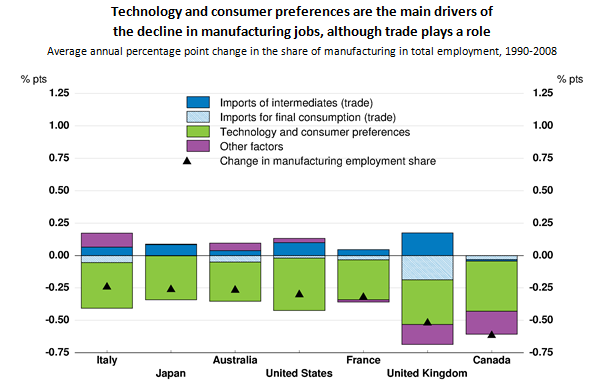Make trade work for all
By Catherine L. Mann, OECD Chief Economist and Head of Economics Department
The special chapter of the June 2017 Economic Outlook calls for action to diagnose and respond to structural trends, focussing on globalisation. International trade has been a powerful engine of global economic growth and convergence in living standards between countries. Despite these benefits, there has been a widespread backlash against trade and political support for protectionist measures has gained ground in G20 countries. Rising inequality and stagnant incomes provide the background to this discontent. Many OECD households have seen little or no gain in disposable income since the early 2000s with a hollowing out of middle-skill jobs. Manufacturing employment has been on a declining trend, falling from 16% to 12% of employment in OECD countries since 2000.
Deeper trade integration has come along with rapid changes in specialisation patterns. The share of OECD economies in world exports of goods declined from 80% to below 60% between 1995 and 2015. At the same time, trade in business and financial services has grown around 1.5 times faster than for goods. OECD countries have strengthened their specialisation in services and moved up the complexity ladder in their goods exports. Since the 1990s, while emerging market economies have increased the complexity of their product mix and the share of knowledge-intensive activities in their manufacturing sectors, they still remain behind major OECD countries in these areas.
Rising trade integration, like technological progress, has brought benefits for firms and consumers but also economic disruptions. Untangling the role of trade in shaping the trends in employment and inequality from the effects of technology and shifting consumer preferences is difficult. New analysis conducted in this Economic Outlook shows that competition from imports has had a relatively modest impact on manufacturing jobs. The main drivers of jobs losses have been technological progress and a rising share of consumption going to services. Countries well integrated in global value chains and importing intermediate goods for export, such as Germany, Czech Republic, Slovakia and Estonia, have generally tended to experience a lower decline in manufacturing jobs than other economies.

Even if trade-related job losses are limited, their costs are amplified by the fact that they fall heavily on some people and regions due to the geographical concentration of manufacturing activities. Regions that experience steep declines in manufacturing employment rates often do not create new jobs in other sectors to offset the job losses, and skill requirements may also differ. As a result, some local economies, particularly rural areas, suffer long-lasting losses from shocks to their manufacturing industries. Countries that have lost more manufacturing jobs – due to stronger import competition, technological change or the evolution of consumer preferences – have experienced a greater increase in income disparity across regions.

This Economic Outlook argues that an integrated policy approach combining actions at the international, national and sub-national levels is needed to make trade work for all. Addressing concentrated economic disruptions will require stronger efforts to help vulnerable workers move to new jobs and to equip them with the skills to succeed in a changing world. In particular, actions to enhance the productivity and employment capacities of lagging regions should be stepped up to promote a more equal sharing of the large gains from trade and technological progress. Coherent packages of measures should be pursued to assist displaced workers, promote inclusiveness and create new opportunities by encouraging new firm entry and innovation, as highlighted in the OECD Going for Growth 2017. In addition, the regional dimension of policy packages should be more systematically addressed. Finally, domestic policy should be complemented by international agreements that help level the playing field.
References:
OECD (2017), “How to make trade work for all”, in OECD Economic Outlook, Volume 2017 Issue 2, OECD Publishing, Paris.
Araujo, S., T. Chalaux and D. Haugh (2017), “Who’s in Your Export Market? The Changing Pattern of WorldTrade in the Age of GVCs”, OECD Economics Department Working Papers, OECD Publishing, Paris (forthcoming).
Demmou, L., C. Thubin and Y. Kalantzis (2017), “De-industrialisation in OECD Countries: A Simple Accounting Approach”, OECD Economics Department Working Papers, OECD Publishing, Paris (forthcoming).
Rusticelli, E., A. Arquie, D. Haugh and D. Turner (2017), “Going Local: A Regional Perspective on International Trade, Labour Markets and Inequality”, OECD Economics Department Working Papers, OECD Publishing, Paris (forthcoming).